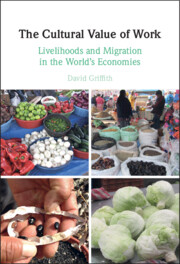Book contents
- The Cultural Value of Work
- The Cultural Value of Work
- Copyright page
- Dedication
- Contents
- Figure
- Tables
- Preface
- Acknowledgments
- Introduction
- Part I Labor in Ethnohistorical Settings
- Part II Values of Forms of Labor
- Part III Work and Labor in Economic and Anthropological Theory
- 8 Labor, Value, Culture
- 9 Anthropology of Economics
- Appendix A A Note on the Qualifications of the Author
- References
- Index
8 - Labor, Value, Culture
from Part III - Work and Labor in Economic and Anthropological Theory
Published online by Cambridge University Press: 14 July 2022
- The Cultural Value of Work
- The Cultural Value of Work
- Copyright page
- Dedication
- Contents
- Figure
- Tables
- Preface
- Acknowledgments
- Introduction
- Part I Labor in Ethnohistorical Settings
- Part II Values of Forms of Labor
- Part III Work and Labor in Economic and Anthropological Theory
- 8 Labor, Value, Culture
- 9 Anthropology of Economics
- Appendix A A Note on the Qualifications of the Author
- References
- Index
Summary
Since the 1989 fall of the Berlin Wall and the breakup of the Soviet Bloc, temporary and part-time wage labor, and particularly the use of immigrant and contract labor, have become increasingly common in the lives of workers, the creation of value, and the distribution of wealth. These conditions have facilitated the emergence of multiple economic formations often referred to, in popular media and scholarly writing, as new “economies” such as the gig economy, the informal economy, the sharing economy, and the gift economy. These formations have served as subsidies to prevailing capitalist political economics and alternatives to engaging in wage labor, simultaneously complementing and competing with dominant economic formations. This chapter discusses the dynamic relations that workers of the 21st century have forged among multiple livelihoods and economic formations, considering, in particular, how they derive value from distinct yet complementary formations.
- Type
- Chapter
- Information
- The Cultural Value of WorkLivelihoods and Migration in the World's Economies, pp. 173 - 196Publisher: Cambridge University PressPrint publication year: 2022

